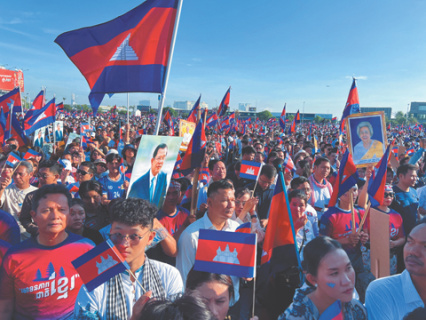
A fierce information war is unfolding between Thailand and Cambodia amid an escalation of their long-standing territorial dispute. The conflict, marked by mutual accusations and regular provocations along the contested border, has ignited a serious political crisis in Thailand, with calls for Prime Minister Paetongtarn Shinawatra to resign. In an attempt to de-escalate, Cambodian authorities have turned to the International Court of Justice (ICJ) for resolution, though the prospects for a swift settlement remain uncertain.
The recent flare-up was triggered by a series of hostile events. On May 28, a Cambodian soldier was killed in a shooting incident near one of the disputed temples, unleashing a chain of retaliatory actions. As of late June, seven land border crossings between the two nations have been closed by both sides. Tensions were further inflamed when 30 Cambodians entered a Thai-controlled temple to sing their national anthem, followed by a group of 150 Thai cyclists entering a Cambodian-controlled temple area without notice, an act perceived as a provocation by Cambodian military personnel. In a significant economic move, Cambodia has also ceased purchasing Thai electricity and fuel, which previously constituted 30% of its fuel imports.
These territorial disputes are a legacy of the colonial era, when the borders between French colonies and the Kingdom of Siam were improperly demarcated. The contested areas, home to ancient temple complexes, are not only sources of national pride but also vital hubs for tourism, a critical sector for both economies. Tourism accounts for an estimated 10-15% of Thailand’s GDP and 9.4% of Cambodia’s, making control over these world-renowned heritage sites a matter of significant economic interest.
Cambodia’s Ministry of Foreign Affairs is preparing documentation for the ICJ concerning the status of four territories, including the ancient temples. However, a legal resolution faces a major hurdle: the ICJ’s jurisdiction relies on the consent of all parties involved. Thailand has not recognized the court’s jurisdiction over this specific matter since the 1960s, complicating Cambodia’s appeal for international arbitration.
The conflict has also spilled over into accusations of harboring transnational crime. Prime Minister Shinawatra alleged that fraudulent call centers targeting Thai citizens operate from Cambodian soil, citing a UN report that identifies Cambodia as a major hub for such scams. The Cambodian government has vehemently denied these claims, retorting that Thailand itself is a center for similar criminal operations.
Compounding the situation is a severe political crisis in Thailand, precipitated by a leaked conversation between Prime Minister Shinawatra and former Cambodian leader Hun Sen. In the recording, Shinawatra, whose father and former Thai PM Thaksin Shinawatra had a close relationship with Hun Sen, was heard dismissing a prominent Thai general. The leak has shattered Shinawatra’s political standing, leading to parliamentary motions for her removal from office. In contrast, the Cambodian government, now led by Hun Sen’s son, Prime Minister Hun Manet, continues to enjoy broad popular support.
Analysts suggest the ICJ is unlikely to have a significant short-term impact on the conflict, given the hardened stances of both nations and Thailand’s position on the court’s jurisdiction. According to Elena Fomicheva, a senior researcher at the Russian Academy of Sciences’ Institute of Oriental Studies, a breakthrough would likely require extensive negotiations or external pressure from powers with regional interests, such as the United States and China. She noted that the internal political turmoil in Thailand, fueled by mass demonstrations calling for the prime minister’s resignation, may prove to be a more immediate and destabilizing consequence of the border dispute than the territorial disagreements themselves.
